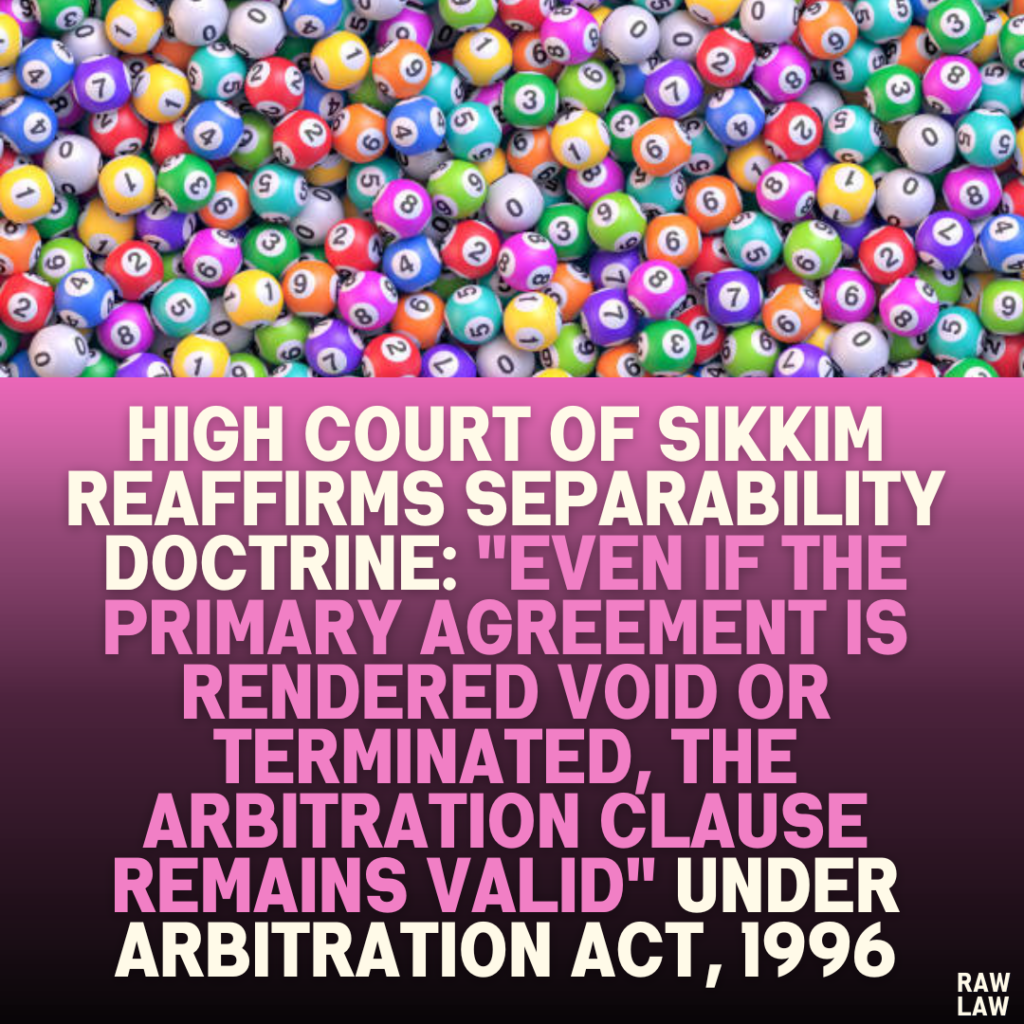Court’s Decision:
The High Court of Sikkim overturned the decision of the District Judge, who had invalidated the arbitral award based on the invalidation of the underlying contract. The court clarified that under the Arbitration and Conciliation Act, 1996, an arbitration clause is separable from the main contract. Even if the primary contract is rendered void or terminated, the arbitration clause can still stand independently and facilitate dispute resolution.
Facts of the Case:
- Agreement for Lottery Operations:
- On August 24, 2001, the State of Sikkim entered into an agreement with a private entity appointing it as the sole marketing agent for an online computerized lottery system. The agreement was for seven years, with a minimum assured revenue clause.
- The agreement included an arbitration clause for resolving disputes.
- Legal Challenge to the Agreement:
- The legality of the tender process and the agreement itself were challenged in writ petitions before the High Court of Sikkim.
- In 2003, the High Court quashed the tender process and the agreement. However, it allowed the private entity to continue operations temporarily under specific conditions while the State sought fresh tenders.
- Dispute Arises:
- Post-agreement nullification, disputes surfaced over payments and performance. The private entity sought arbitration under the original agreement.
- The arbitrator awarded ₹96.48 crores to the State of Sikkim, but this award was challenged under Section 34 of the Arbitration Act before the District Judge.
- District Judge’s Ruling:
- The District Judge set aside the arbitral award, holding that the arbitration clause was no longer valid since the underlying agreement was quashed. The judgment relied on principles from the older Arbitration Act, 1940.
Issues:
- Can an arbitration clause survive when the main agreement has been declared invalid or quashed?
- Did the District Judge err in invalidating the arbitration award on the grounds that the arbitration clause perished with the agreement?
Petitioner’s Arguments (State of Sikkim):
- The petitioner argued that since the main agreement was nullified, the arbitration clause, being part of the contract, also ceased to exist.
- The District Judge’s ruling, based on earlier precedents under the Arbitration Act, 1940, was relied upon to invalidate the arbitral award.
Respondent’s Arguments (Private Party):
- The respondent contended that under the Arbitration and Conciliation Act, 1996, the arbitration clause is separable from the main contract.
- Even if the main contract was quashed, the arbitration agreement could independently survive to resolve disputes.
Analysis of the Law:
- Doctrine of Separability:
- Section 16 of the Arbitration and Conciliation Act, 1996, establishes the principle of separability. This means that an arbitration clause is treated as an independent agreement within the contract.
- The doctrine ensures that the arbitration agreement remains valid even if the main contract is declared void or terminated.
- Shift from the 1940 Act to the 1996 Act:
- The court highlighted that the Arbitration and Conciliation Act, 1996, significantly differs from the earlier Arbitration Act, 1940.
- Earlier precedents, such as Union of India v. Kishorilal Gupta and Bros., held that an arbitration clause perished with the contract. However, this view has been rendered obsolete under the 1996 Act.
- Key Precedents Analyzed:
- Sundaram Finance Ltd. v. NEPC India Ltd. (1999): The Supreme Court emphasized that the provisions of the 1996 Act must be interpreted independently and uninfluenced by principles from the 1940 Act.
- In Re Interplay Between Arbitration Agreements and Stamp Act, 1899 (2024): The Supreme Court upheld that arbitration agreements are separable and remain valid even if the underlying contract is void, terminated, or illegal.
- Magma Leasing v. Potluri Madhavilata (2009): The Supreme Court reiterated that an arbitration agreement persists even after the termination of the underlying contract for resolving disputes related to it.
Precedent Analysis:
- Outdated View:
- Cases like Union of India v. Kishorilal Gupta (1959) and Waverly Jute Mills v. Raymon & Co. (1963) were based on the older legal regime. These held that arbitration clauses perished with the main contract, considering them integral rather than independent.
- Modern Doctrine of Separability:
- The enactment of the 1996 Act introduced a shift. The separability doctrine and the competence-competence principle empower arbitral tribunals to decide their jurisdiction, even in disputes over the validity of the main contract.
Court’s Reasoning:
- The District Judge’s ruling was flawed as it failed to consider the evolution of arbitration law under the 1996 Act.
- The court underscored that the arbitration clause does not automatically perish with the main contract. Instead, it survives to facilitate dispute resolution.
- The separability doctrine ensures the independence of the arbitration agreement, allowing disputes to be resolved despite the invalidity or termination of the main agreement.
Conclusion:
The High Court of Sikkim quashed the District Judge’s ruling and reinstated the validity of the arbitration clause and the resulting arbitral award. It affirmed that arbitration clauses under the Arbitration and Conciliation Act, 1996, are separable and enforceable, regardless of the status of the main contract.
Implications:
- Reinforcement of Arbitration as a Dispute Resolution Mechanism:
- The judgment strengthens the autonomy of arbitration clauses, encouraging parties to rely on arbitration for resolving disputes.
- Clarity in Legal Framework:
- By aligning with modern precedents and the 1996 Act, the judgment provides clarity on the application of the separability doctrine.
- Encouragement for Commercial Contracts:
- The decision safeguards arbitration agreements in commercial contracts, ensuring that invalidity or disputes over the main contract do not derail the dispute resolution process.
This judgment sets a significant precedent for the enforcement of arbitration clauses under the Arbitration and Conciliation Act, 1996.




Pingback: Calcutta High Court: Adverse Possession Requires Trial to Prove Essential Conditions; Rejection of Plaint Under Order 7 Rule 11 Must Be Based Solely on Plaint’s Averments - Raw Law